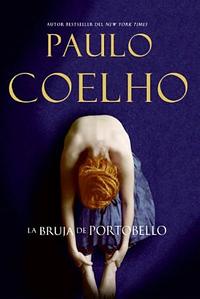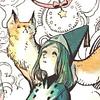Take a photo of a barcode or cover
"...she was following the classic path of the witch, who, through her individual persona, seeks contact with the upper and lower world but always ends up destroying her own life-she serves others, gives out energy, but receives nothing in return."
Took me a long time to read this one. I enjoyed it yet felt like it took to long to know why she was the witch of portobello. However, a lot of the lessons taught in the book are well worth the read.
I picked up this book because I like portobello mushrooms and witches. Turns out this book isn't about either one of these things. Despite this, I really enjoyed this book!
First thing is first, this isn't a fiction or fantasy book. It isn't trying to be a fiction or fantasy book. So, insulting it for not being these things isn't fair. There are a lot of bad reviews for this book on this website and I think that's why. This book isn't really a novel. It also isn't a Biology textbook or a historical account of the Civil War. It is pointless to be angry at it for not being these other things. I suggest entering this book with an open mind.
This book IS a discourse about returning to pagan routes.
This might be confusing because there are characters and there is a plot, however, these aspects are just aesthetics so the reader can be engaged in the discourse. Also, this book is "preachy" because elaborating on paganism is the entire point of the book. Religion and spirituality are mentioned in every scene not because the author is uncreative but because that's what this book is about! It is best to understand this book as a emotional and exciting essay instead of a fantasy book about witches.
I could easily rate this book three stars, but I'm ignoring the Epilogue and giving it a four. The story was building up the idea that human's spiritual intellect isn't sharp enough to really know what is going on out there. And that awful things happen even if you have a feeling everything will turn out alright. AND I love that dark cynical point of view that is sprinkled throughout this book. But when you get to the Epilogue and it turns that on its face, well, I think that as intentional, but for me it was extremely agitating. Look, from chapter one, you know something really awful is going to happen to the MC. You don't forget because it is repeated throughout the narrative. It is only a couple of sentences but it is the only clue to negativity in this entire book, the rest is VERY optimistic and positive.
When reading this book I thought, 'If there really is a Blessed Mother then why do such horrific things happen to her children?' But this question isn't even touched upon! If the author has a different philosophical perspective, then ok, but make your argument. Totally ignoring legitimate concerns really weakens the thesis.
Paganism is a big deep world but this elementary introduction was perfect for me because I'm really elementary with this kind of stuff. Paganism wasn't sold to me, but in a lot of ways that was just the vessel. The MC rejected Christianity and went to back to her routes and found Paganism. This reject and replace, this independence, that she has is powerful and resonated with me.
First thing is first, this isn't a fiction or fantasy book. It isn't trying to be a fiction or fantasy book. So, insulting it for not being these things isn't fair. There are a lot of bad reviews for this book on this website and I think that's why. This book isn't really a novel. It also isn't a Biology textbook or a historical account of the Civil War. It is pointless to be angry at it for not being these other things. I suggest entering this book with an open mind.
This book IS a discourse about returning to pagan routes.
This might be confusing because there are characters and there is a plot, however, these aspects are just aesthetics so the reader can be engaged in the discourse. Also, this book is "preachy" because elaborating on paganism is the entire point of the book. Religion and spirituality are mentioned in every scene not because the author is uncreative but because that's what this book is about! It is best to understand this book as a emotional and exciting essay instead of a fantasy book about witches.
I could easily rate this book three stars, but I'm ignoring the Epilogue and giving it a four. The story was building up the idea that human's spiritual intellect isn't sharp enough to really know what is going on out there. And that awful things happen even if you have a feeling everything will turn out alright. AND I love that dark cynical point of view that is sprinkled throughout this book. But when you get to the Epilogue and it turns that on its face, well, I think that as intentional, but for me it was extremely agitating. Look, from chapter one, you know something really awful is going to happen to the MC. You don't forget because it is repeated throughout the narrative. It is only a couple of sentences but it is the only clue to negativity in this entire book, the rest is VERY optimistic and positive.
When reading this book I thought, 'If there really is a Blessed Mother then why do such horrific things happen to her children?' But this question isn't even touched upon! If the author has a different philosophical perspective, then ok, but make your argument. Totally ignoring legitimate concerns really weakens the thesis.
Paganism is a big deep world but this elementary introduction was perfect for me because I'm really elementary with this kind of stuff. Paganism wasn't sold to me, but in a lot of ways that was just the vessel. The MC rejected Christianity and went to back to her routes and found Paganism. This reject and replace, this independence, that she has is powerful and resonated with me.
reflective
relaxing
slow-paced
Plot or Character Driven:
Character
Loveable characters:
Complicated
I love how Coelho makes you think, reels you in and speaks to you in so many different ways.
3.5 pushed up to 4 because I found this to be very relevant, but perhaps written by the wrong person. RTC.
I find it hard to see how this book is from the same author who wrote the alchemist.
While I enjoyed this book in the sense that it wasn't boring at all, it kept me reading to see what would happen, the whole time I felt distant from the story and the characters. I've rarely cared so little about characters; they felt flat and uninteresting; I didn't get pulled into the book; I didn't walk amongst them. They could all die for all I care.
The writing, that is, the words themselves, flow beautifully, and Coelho's magic translates into the words. But the characters are not magic. It might be the style of the book - Coelho presents the story through the eyes of a handful of characters, and each one's voice was the same in my mind. Is this a translation issue? I don't know. I look forward to reading more of his books to compare.
The writing, that is, the words themselves, flow beautifully, and Coelho's magic translates into the words. But the characters are not magic. It might be the style of the book - Coelho presents the story through the eyes of a handful of characters, and each one's voice was the same in my mind. Is this a translation issue? I don't know. I look forward to reading more of his books to compare.
Poor in story, not so great in philosophy.
"A teacher should teach what he doesn't know, in order to learn." Paulo Coelho seems to be following his own philosophy, while telling this story. And in an effort of teaching so many things he doesn't know himself, 'Witch of Portobello' suffers greatly and turns into a sermon itself. Even though interest of general human population has increased towards spirituality, the philosophy didn't help the book either. On the other hand we don't connect with characters as we should, because the work on characters is pretty sloppy. There is almost nothing to identify with! Though arrogant, but Athena seems to be a very happy-go-lucky woman since the start. The thing that barely connects us with her is when she tries to fight for her kid, but it comes so late in the story even it seems fake.
So while being a story of poorly drawn characters, at the same time with plot barely holding the book together, it's a book of tripe writing. The Alchemist remains magnum opus of Paulo Coelho.
For the lovers of the Alchemist, recommended, so the true objective of this book can be contemplated.
For those spiritually challenged human beings, there is enough mysticism in Harry Potter books.
"A teacher should teach what he doesn't know, in order to learn." Paulo Coelho seems to be following his own philosophy, while telling this story. And in an effort of teaching so many things he doesn't know himself, 'Witch of Portobello' suffers greatly and turns into a sermon itself. Even though interest of general human population has increased towards spirituality, the philosophy didn't help the book either. On the other hand we don't connect with characters as we should, because the work on characters is pretty sloppy. There is almost nothing to identify with! Though arrogant, but Athena seems to be a very happy-go-lucky woman since the start. The thing that barely connects us with her is when she tries to fight for her kid, but it comes so late in the story even it seems fake.
So while being a story of poorly drawn characters, at the same time with plot barely holding the book together, it's a book of tripe writing. The Alchemist remains magnum opus of Paulo Coelho.
For the lovers of the Alchemist, recommended, so the true objective of this book can be contemplated.
For those spiritually challenged human beings, there is enough mysticism in Harry Potter books.






